2 February 2023 –
With support from the UNCAC Coalition, civil society in Togo is involved in the adoption of the national anti-corruption strategy and advancing the discussion on the adoption of an anti-corruption law.
How are civil society voices making a difference in the fight against corruption? Stories like this one from our member organization in Togo is one way we can measure impact.
While much of our work as a Coalition is internationally focused, having an impact at a national level is a top priority as an organization dedicated to fighting corruption. Our priority is to strengthen the implementation of the UN Convention against Corruption (UNCAC) around the world.
A ‘National Strategy for the Prevention and Fight against Corruption and Assimilated Offenses’ (SNPLCIA) was adopted in Togo by the government, thanks in part to l’Alliance Nationale des Consommateurs et de l’Environnement (ANCE-Togo), a civil society member organization of the UNCAC Coalition. The national strategy contains key recommendations from ANCE’s own parallel report on UNCAC implementation at the national level, including the need to adopt a law on the protection of whistleblowers, the creation of a state judicial agency, and a specialized investigative body for the fight against corruption. ANCE’s initiatives to organize meetings with civil society stakeholders and relevant state agencies, share information and ensure civil society participation in technical workshops and meetings ahead of the SNPLCIA’s final reading were crucial to the production of a balanced national strategy.
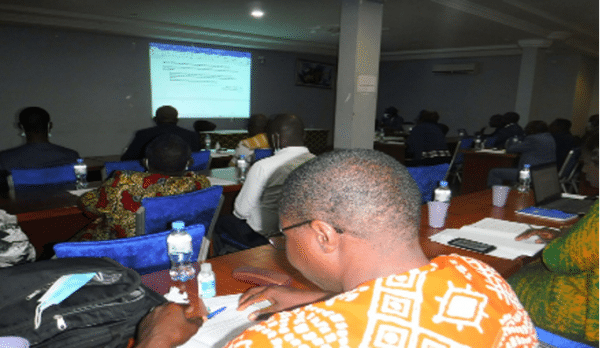
These efforts are part of a new initiative from the UNCAC Coalition, funding civil society organizations to act on recommendations they developed producing a civil society parallel report. Our new initiative enables our members and affiliates to advocate for reforms in their countries.
In analyzing the implementation and compliance (or lack thereof) of the UNCAC in Togo, ANCE identified key areas for improvement. The research informed the development of a civil society parallel report, with the UNCAC Coalition’s support to provide a civil society perspective to accompany the government’s own report on compliance. ANCE published its parallel report in March 2022, which contained detailed recommendations to address gaps in the legal framework and promote actual implementation on the ground (see summary of key findings). In the summer of 2022, the organization began follow-up activities to promote key recommendations laid out in the report.
Goals of the project
Drawing on its analysis of the state of anti-corruption and UNCAC implementation in Togo, ANCE set out to promote good governance, transparency and accountability through two key objectives:
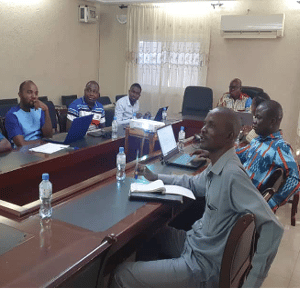
- Advocating for the adoption of a framework law to fight corruption in Togo. The draft law on the prevention of corruption and related offenses in Togo was validated by stakeholders, but progress stagnated for two years within the relevant Ministry. Raising awareness among the general public and engaging in advocacy with state authorities, encouraging them to take action, would highlight the urgency to adopt this law as part of a serious anti-corruption campaign by the state.
- Promoting the participation of civil society in the process of adopting the national anti-corruption strategy (SNPLCIA). Although several civil society organizations had already been consulted in the process of adopting the national strategy, wider civil society involvement would allow for stronger advocacy on key recommendations to be incorporated into the SNPLCIA, such as the need to review Togo’s existing legal and institutional frameworks, and the strengthening of sanctions against acts of corruption.
Advocacy activities
To build support for these issues, ANCE:
- Published a summary of its own parallel report and distributed 200 copies to relevant stakeholders, among them, government officials, representatives of civil society organizations and the media.
- Organized advocacy actions and meetings with governmental and public bodies: members of the High Authority for the Prevention and Fight against Corruption (HAPLUCIA), the National Financial Information Processing Unit (CENTIF), the Court of Accounts of Togo, the General State Inspectorate (IGE) and the Public Procurement Regulatory Authority (ARMP), among others, to share the content of the parallel report, discuss strengths and weaknesses of each body, and discuss recommendations for a stronger framework for the fight against corruption in Togo.
- Conducted strategic communications by participating in two televised programs watched by over two million citizens to raise awareness about the status of anti-corruption efforts in Togo and the importance of strengthening this framework. They also gathered 20 civil society representatives and journalists in a hybrid meeting to discuss advocacy.
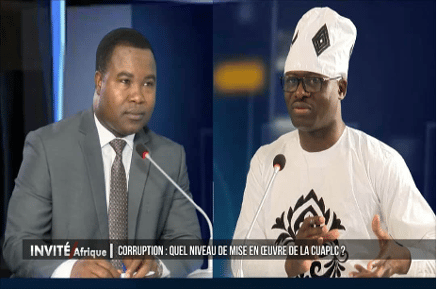
- Supported the participation of seven other civil society organizations in meetings and workshops as part of the adoption process for the SNPLCIA and organized informative sessions to help civil society organizations prepare for the process.
Success and results
Through these outreach and advocacy activities, ANCE met the objectives it set out to achieve through this project and successfully advanced anti-corruption in Togo.
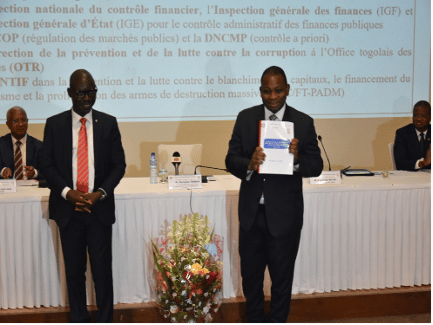
- Generated greater support for the adoption of the draft bill on the prevention of corruption from relevant stakeholders, both governmental and non-governmental. Strategic communications allowed for public discourse on the sensitive issue of corruption. During televised programs on New World TV, viewers enquired about why corruption cases are seldom brought before the courts, and why the process of adopting the draft law on corruption prevention is dragging on.
- ANCE’s ongoing advocacy for the adoption of the draft bill has prompted high-level exchanges between the relevant government institutions. Consensus is gradually emerging towards the adoption of the draft bill on the prevention and fight against corruption. The next steps on this are an in-depth study by the Social Development Commission of the General Secretariat of the Government, after which it can be placed on the agenda of the Council of Ministers.
- The vast majority of the recommendations from CSOs were integrated into the National Strategy. Publishing and disseminating a summary of ANCE’s report promoted better knowledge of the key recommendations for strengthening the fight against corruption in Togo. In a technical workshop organized by the High Authority for the Prevention and Fight against Corruption and Similar Offenses (HAPLUCIA) in August 2022, CSOs strongly advocated for the updating of legal and institutional frameworks in the fight against corruption; the adoption of the anti-corruption law; the adoption of the law on the protection of whistleblowers; the creation of a state judicial agency; the creation of an investigative body specializing in the fight against corruption, and the creation of a financial prosecution service. The SNPLCIA was adopted on October 13, 2022 in Lomé during a national workshop chaired by a representative of the Prime Minister of Togo (see also Lomegraph and L’Interview).
- As part of a national capacity-building workshop for women’s and youth organizations on the fight against corruption in October 2022, ANCE trained 35 CSOs on the SNPLCIA.
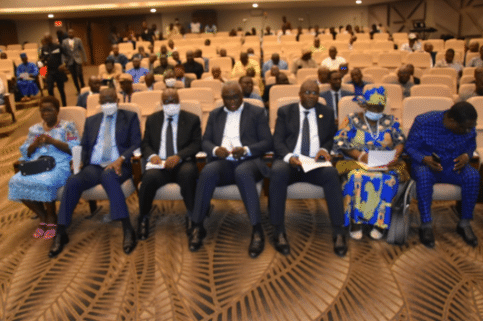
Next steps
ANCE intends to pursue advocacy actions within government circles for the draft law on corruption prevention in Togo, for its adoption by the Council of Ministers and following this, by the National Assembly. With regards to the SNPLCIA, ANCE is planning evaluation reports on the implementation of the strategy at the mid-term (2024) and final (2026) stages. In addition, two seats have been set aside for civil society in the National Steering Committee, and ANCE will be well-placed to advocate for the implementation of the strategy. Through continuous advocacy, ANCE hopes to advance strong anti-corruption reforms and the active participation of civil society in Togo’s country review process under the UNCAC.



